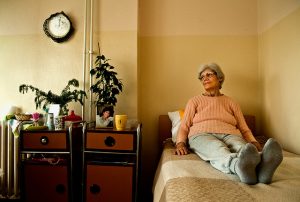While there’s no 100% absolute way to ensure your elderly parent or loved one doesn’t fall,
there are things that can be done to help minimize the risk. I’ll give you a quick checklist of
five steps to a safer home for a senior. Likewise, click here for some alternative ways to
steer clear of falls.
1. Furniture, accessories, and narrow pathways:
Is there furniture crowding a room or creating narrow pathways? Are there inessential
items or decorations all over the house? None of us like to throw things away and we all
know seniors love to keep antiques and knick-knacks, but sometimes they can pose a
hazard to elderly home safety. That old rug underneath the coffee table can trip you easier
than you think. Make sure there is nothing impeding easy travel throughout the house. A
straight path is the easiest path so there should be no navigating around corners or edges.
2. Doorsills and steps:
Now, these two sound like obvious culprits, but you’d be surprised how often they’re
underestimated. A quick remedy is to paint doorsills a different color or buy reflective tape
for the edge as a reminder that they’re there. This goes for the edge of stairs as well.
Confirm that there’s no loose carpeting, unstable wood, or erosion of any kind on steps or
doorsills. Also, make sure any area with a step or uneven surface is very well lit.
3. Lighting:
This one is perhaps the easiest of all. Double-check that all areas of the house are well lit,
with bulbs at least 60 watts or higher in each socket. Remove all exposed cords and make
sure any lamp or light-switch is within easy reach. If the lamp closest to a favorite reading
chair is hard to reach while sitting, move it closer. Also, check that there is no risk of any
lamp falling or being tripped over. Again, lamps should remain within reach, but still out of
the way.
4. Telephones:
Keep a telephone, within easy reach, in each room. This prevents your elderly loved one
from feeling compelled to rush to a ringing phone. Not only can getting up too quickly cause
light-headedness or dizziness, but it can also cause an elderly person to lose focus on their
surroundings and mistakenly fall in an easily preventable situation.
5. Bathrooms:
Bathroom floors and shower tubs can get slippery, we know this. To combat slipping,
guarantee there are either bars affixed to the wall or a counter to grip while getting up and
down off the toilet and in and out of the shower. Also, purchase adhesive grip-tape for the
tub bottom and again, provide adequate lighting throughout the bathroom. Shower rugs
can also slip so place double-sided tape on the bottom of the rug to impede the rug’s
movement.
If you are worried about a loved one, these are very easy and painless steps to minimize the
risk of in-home falls. As mentioned before, however, there is no 100% way to prevent accidents so medical alert systems provide a great backup. Not only do they give you peace
of mind when you’re not around your loved one, but they make the wearer feel safe as well.
Jacob Edward is the manager of Senior Planning in Phoenix Arizona. Senior Planning is geared towards helping
seniors and the disabled with finding and arranging types of care, as well as applying for state and federal
benefits.

